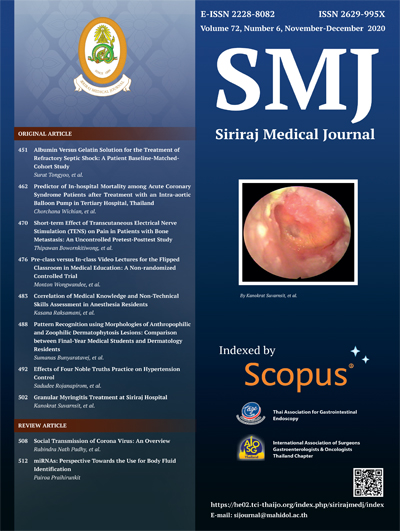Correlation of Medical Knowledge and Non-Technical Skills Assessment in Anesthesia Residents
DOI:
https://doi.org/10.33192/Smj.2020.65Keywords:
Non-technical skills, Anesthetists’ non-technical skills, assessmentAbstract
Objective: Non-technical skills training and assessment has been implemented in anesthesia residency training program to improve quality of patient care but have not been properly assessed. We hypothesized that trainees with good knowledge correlated with good cognitive parts of non-technical skills.
Methods: Seventy anesthesia residents (24 PGY-1, 24 PGY-2 and 22 PGY-3) were assessed for their knowledge by 180-item MCQs, 5 key-feature essay questions, and 18-station OSCE’s. Subsequently, a perioperative anesthesia crisis situation was set up in the simulation lab for all residents and was video recorded. Non-technical skills were assessed by 2 independent trained raters using Anesthetists’ Non-Technical Skills (ANTS) behavioral markers. The residents’ scores were calculated to find the correlation within the ANTS rating scale.
Results: The mean scores of knowledge tests were 164.3 ±18.4 out of 300 [165.5 ±18.0, 154.7 ±16.3 and 173.6 ±16.4 for PGY-1, PGY-2 and PGY-3 respectively]. The mean scores of ANTS was divided into 4 categories (rating scale 1 to 4): task management 2.9 (±0.6), teamworking 3.0 (±0.5), situation awareness 2.9 (±0.8) and decision making 2.8 (±0.7). The knowledge test results moderately correlated with ANTS score in task management, situation awareness and decision making [r=0.382 (p<0.01), r=0.433 (p<0.001) and r=0.350 (p<0.01) respectively] and weakly correlated with the teamworking category (r=0.166, p=0.16).
Conclusion: Resident’s scores showed moderate correlation with non-technical skills assessment results in cognitive skills. Non-technical skills are required to be trained and assessed together with knowledge to enhance the patient’s safety and outcome.
References
2. Glavin RJ. Excellence in Anesthesiology. The Role of Nontechnical Skills. Anesthesiology 2009; 110(2):201-3.
3. Flin R, Patey R, Glavin R, Maran N. Anaesthetists’ non-technical skills. British journal of anaesthesia 2010; 105(1):38-44.
4. Fletcher G, Flin R, McGeorge P, Glavin R, Maran N, Patey R. Anaesthetists’ Non-Technical Skills (ANTS): evaluation of a behavioural marker system. British journal of anaesthesia 2003; 90(5):580-8.
5. Fletcher G, Flin R, McGeorge P, Glavin R, Maran N, Patey R. Rating non-technical skills: developing a behavioural marker system for use in anaesthesia. Cognition, Technology & Work 2004; 6(3):165-71.
6. Flin R, Patey R. Non-technical skills for anaesthetists: developing and applying ANTS. Best Practice & Research Clinical Anaesthesiology 2011; 25(2):215-27.
7. Engel N, Patey RE, Ross S, Wisely L. Non-technical skills. BMJ 2008; 337:0812454.
8. Yule S, Maran N, Tsuburaya A. Training methods for non-technical skills. in Flin R, Youngson G, Yule S, Editors, Enhancing surgical performance. A primer on non-technical skills, CRC Press, London; 2015.
9. Gordon M, Baker P, Catchpole K, Darbyshire D, Schocken D. Devising a consensus definition and framework for non-technical skills in healthcare to support educational design: a modified Delphi study. Medical teacher 2015; 37(6):572-7.
10. Mishra A, Catchpole K, Dale T, McCulloch P. The influence of non-technical performance on technical outcome in laparoscopic cholecystectomy. Surgical endoscopy 2008; 22(1):68-73.
11. Riem N, Boet S, Bould MD, Tavares W, Naik VN. Do technical skills correlate with non-technical skills in crisis resource management: a simulation study. British journal of anaesthesia 2012; 109(5):723-8.
12. Doumouras AG, Hamidi M, Lung K, Tarola CL, Tsao MW, Scott JW et al. Non‐technical skills of surgeons and anaesthetists in simulated operating theatre crises. British Journal of Surgery 2017; 104(8):1028-36.
13. Gjeraa K, Jepsen RMHG, Rewers M, Østergaard D, Dieckmann P. Exploring the relationship between anaesthesiologists’ non‐technical and technical skills. Acta Anaesthesiologica Scandinavica 2016; 60(1):36-47.
14. Jirativanont T, Raksamani K, Aroonpruksakul N, Apidechakul P, Suraseranivongse S. Validity evidence of non-technical skills assessment instruments in simulated anaesthesia crisis management. Anaesthesia and intensive care 2017; 45 (4):469-75.
15. Kirkwood BR, Sterne JA. Chapter 10. Linear regression and correlation. In: Essential medical statistics.2nd ed. Oxford: Blackwell Science Ltd; 2003. pp. 93–96.
16. Gaba DM, Howard SK, Small SD. Situation awareness in anesthesiology. Human factors 1995; 37(1):20-31.
17. Schulz CM, Endsley MR, Kochs EF, Gelb AW, Wagner KJ. Situation awareness in anesthesia: concept and research. Anesthesiology 2013; 118(3):729-42.
18. Schulz CM, Krautheim V, Hackemann A, Kreuzer M, Kochs EF, Wagner KJ. Situation awareness errors in anesthesia and critical care in 200 cases of a critical incident reporting system. BMC anesthesiology 2015; 16(1):4.
19. Gaba DM. Dynamic decision-making in anesthesiology: cognitive models and training approaches. In Advanced models of cognition for medical training and practice 1992 Springer, Berlin and Heidelberg: pp. 123-47.
20. Stiegler MP, Tung A. Cognitive processes in anesthesiology decision making. Anesthesiology 2014; 120(1):204-17.
21. Weinger MB, Slagle J. Human factors research in anesthesia patient safety: techniques to elucidate factors affecting clinical task performance and decision making. Journal of the American Medical Informatics Association 2002; 9(Supplement 6): S58-S63.
22. Yee B, Naik VN, Joo HS, Savoldelli GL, Chung DY, Houston PL, et al. Nontechnical skills in anesthesia crisis management with repeated exposure to simulation-based education. Anesthesiology 2005; 103(2): 241-8.
23. Wacker J, Kolbe M. Leadership and teamwork in anesthesia–making use of human factors to improve clinical performance. Trends in anaesthesia and critical care 2014; 4(6):200-5.
24. Mills P, Neily J, Dunn E. Teamwork and communication in surgical teams: implications for patient safety. Journal of the American College of Surgeons 2008; 206(1):107-12.
Downloads
Published
How to Cite
Issue
Section
License
Authors who publish with this journal agree to the following conditions:
Copyright Transfer
In submitting a manuscript, the authors acknowledge that the work will become the copyrighted property of Siriraj Medical Journal upon publication.
License
Articles are licensed under a Creative Commons Attribution-NonCommercial-NoDerivatives 4.0 International License (CC BY-NC-ND 4.0). This license allows for the sharing of the work for non-commercial purposes with proper attribution to the authors and the journal. However, it does not permit modifications or the creation of derivative works.
Sharing and Access
Authors are encouraged to share their article on their personal or institutional websites and through other non-commercial platforms. Doing so can increase readership and citations.















